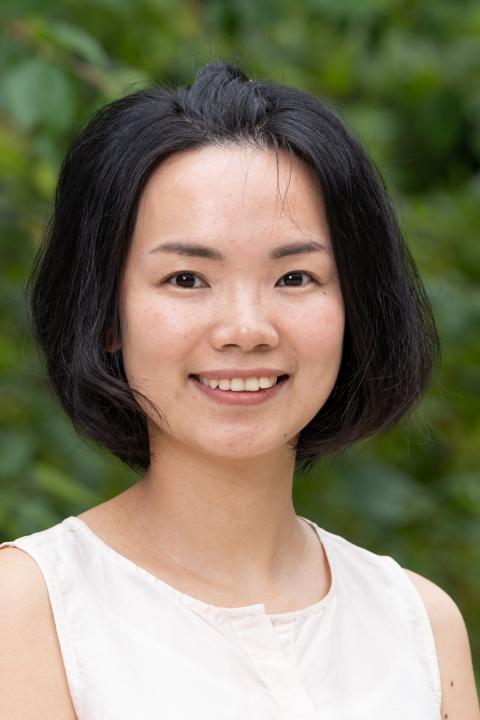
Weiwei Mo
I am looking for highly motivated graduate and undergraduate students to join my group. Interested students are encouraged to contact me by email with their CV and a brief statement of research interests.
Selected awards and honors:
Platinum Sustainability Award in Faculty Research, University of New Hampshire 2022
National Science Foundation CAREER Award 2021
Roland H. O’Neal Professorship, University of New Hampshire 2019-2022
Award of Excellence in Research, College of Engineering and Physical Sciences 2019
Graduate School Summer Faculty Fellowship, University of New Hampshire 2016
Courses Taught
- CEE 505: Intro to Sustainable Eng
- CEE 520: Environmntl Pollutn & Protectn
- CEE 706/806: Environmental Life CycleAssess
- CEE 799H: Senior Honors Thesis
- CEE 907: Systems Thinking and Modeling
- INCO 590: Student Research Experience
Education
- Ph.D., Environmental Engineering, University of South Florida
- M.S., Environmental Engineering, University of South Florida
- B.S., Environmental Engineering, Shanghai Jiao Tong University
Research Interests
- Infrastructure - Water
- Sustainability
- Sustainable Development
Selected Publications
Rowan, S., Bell, E. S., & Mo, W. (2026). Quantifying the hidden carbon cost of floods: a stochastic and uncertainty-based valuation framework. Environmental Research Letters, 21(1), 014009. doi:10.1088/1748-9326/ae2d76
Asadifakhr, K., Huang, J., Perkins, P., Lucey, K., Wang, H., Han, F., & Mo, W. (2026). Bridging priorities: Stakeholder preferences, networks, and barriers in road-stream crossing management.. PLoS One, 21(1), e0339740. doi:10.1371/journal.pone.0339740
Huang, J., Zhang, Y., & Mo, W. (2025). When Water Turns Risky: Linking Stakeholder Behavioral Preferences to Drinking Water Emergency Outcomes.. Environ Sci Technol. doi:10.1021/acs.est.5c11579
Mohiuddin, M. D., Bai, L., & Mo, W. (2025). Reverse logistics for electric vehicle batteries: A systematic review. Computers & Industrial Engineering, 208, 111327. doi:10.1016/j.cie.2025.111327
Ghasemi, R., Doko, G., Petrik, M., Wosnik, M., Lu, Z., Foster, D. L., & Mo, W. (2025). Deep reinforcement learning-based optimization of an island energy-water microgrid system. Resources, Conservation and Recycling, 222, 108440. doi:10.1016/j.resconrec.2025.108440
Mo, W., Soh, L., Werber, J. R., Elimelech, M., & Zimmerman, J. B. (2015). Application of membrane dewatering for algal biofuel. ALGAL RESEARCH-BIOMASS BIOFUELS AND BIOPRODUCTS, 11, 1-12. doi:10.1016/j.algal.2015.05.018
Mo, W., Wang, R., & Zimmerman, J. B. (2014). Energy-Water Nexus Analysis of Enhanced Water Supply Scenarios: A Regional Comparison of Tampa Bay, Florida, and San Diego, California. ENVIRONMENTAL SCIENCE & TECHNOLOGY, 48(10), 5883-5891. doi:10.1021/es405648x
Mo, W., & Zhang, Q. (2013). Energy-nutrients-water nexus: Integrated resource recovery in municipal wastewater treatment plants. JOURNAL OF ENVIRONMENTAL MANAGEMENT, 127, 255-267. doi:10.1016/j.jenvman.2013.05.007
Mo, W., & Zhang, Q. (2012). Can municipal wastewater treatment systems be carbon neutral?. JOURNAL OF ENVIRONMENTAL MANAGEMENT, 112, 360-367. doi:10.1016/j.jenvman.2012.08.014
Mo, W., Nasiri, F., Eckelman, M. J., Zhang, Q., & Zimmerman, J. B. (2010). Measuring the Embodied Energy in Drinking Water Supply Systems: A Case Study in The Great Lakes Region. ENVIRONMENTAL SCIENCE & TECHNOLOGY, 44(24), 9516-9521. doi:10.1021/es1015845